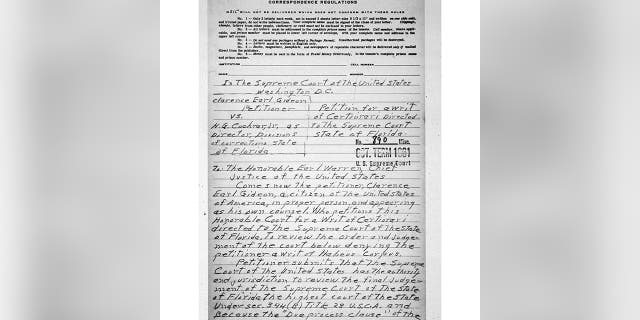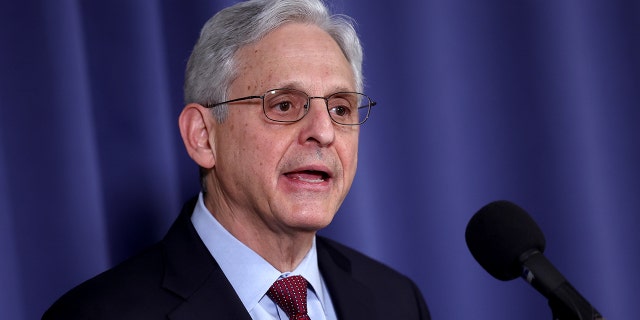Saturday marks the 60th anniversary of the Supreme Court’s landmark ruling in Gideon vs. wainwright, in which the justices unanimously affirmed a constitutional right to a lawyer for criminal defendants who could not afford one.
Much has been written about the case, which overruled an earlier decision and forced states to create taxpayer-funded public defender offices. Movies and documentaries have also been made.
Clarence Gideon was charged with breaking into a Panama City, Florida, pool hall on June 3, 1961.
The place was vandalized, and money was stolen from a cash register. A witness later claimed he had seen Gideon leaving the business at 5:30 am with a wine bottle and money in his pocket.
SUPREME COURT REQUESTS EXTRA SECURITY FUNDING AFTER ALLEGED ASSASSINATION ATTEMPT ON CONSERVATIVE JUSTICE
In Gideon vs. wainwrightClarence Gideon was charged with breaking into a Panama City, Florida, pool hall on June 3, 1961. This case led the US Supreme Court to affirm a constitutional right to a lawyer for criminal defendants who could not afford one on their own. (AP Photo/Patrick Semansky, File.)
Based on that account, he was charged with petty larceny and breaking and entering. He was denied a court-appointed lawyer in state court, represented himself, and was convicted.
Here are some of the key moments of the case in the words of those involved:
“Mr. Gideon, I am sorry, but I cannot appoint counsel to represent you in this case. Under the laws of the state of Florida, the only time the court can appoint counsel to represent a defendant is when that person is charged with a capital offense. I am sorry, but I will have to deny your request to appoint counsel to defend you in this case.”
“The United States Supreme Court says I am entitled to be represented by counsel.”
“Gideon seemed a man whose own private hopes and fears had long since been deadened by adversity – a used-up man, looking (15) years older than his actual age of (52). He appeared gaunt, a stooped 6 feet, 140 pounds.”
An appeal to the Florida Supreme Court was denied, so he launched another.
SUPREME COURT COULD TAKE FIRST TRANSGENDER SPORTS CASE WITH APPEAL FROM WEST VIRGINIA SOCCER PLAYER

Clarence Earl Gideon’s petition to the Chief Justice of the United States against a sentence imposed by a Florida court because he had not had legal representation, resulting in the Fifth Amendment, guaranteed ‘due processes of law’. (MPI/Getty Images)
“I, Clarence Earl Gideon, claim that I was denied the rights of the 4th, 5th and 14th amendments of the Bill of Rights. . . . It makes no difference how old I am or what color I am or what church I belong too [sic] if any. The question is I did not get a fair trial. The question is very simple.”
“I think Betts vs. Brady [the 1942 precedent] was wrong when it was decided. I think time has made that clear. And I think that the time has come that the correct rule, the civilized rule, the rule of individualism, the rule of due process must be stated by this court.”
“I believe that this case dramatically illustrates the point that you cannot have a fair trial without counsel. Indeed, I believe that . . . a criminal court is not properly constituted . . . under our adversary system of law, unless there is a judge and unless there is a counsel for the prosecution and unless there is a counsel for the defense.Without that, how can a civilized nation pretend that it is having a fair trial?
SUPREME COURT DENIES PETITION FROM FLORIDA CITY TO TOSS ATHEISTS’ FIRST AMENDMENT SUIT OVER PRAYER VIGIL

“In our adversary system of criminal justice, any person haled into court, who is too poor to hire a lawyer, cannot be assured a fair trial unless counsel is provided for him. This seems to us to be an obvious truth. . . . The right of one charged with crime to counsel may not be deemed fundamental and essential to fair trials in some countries, but it is in ours.From the very beginning, our state and national constitutions and laws have laid great emphasis on procedural and substantive safeguards designed to ensure fair trials before impartial tribunals in which every defendant stands equal before the law.This noble ideal cannot be realized if the poor man charged with crime has to face his accusers without a lawyer to assist him.”
“If an obscure Florida convict named Clarence Earl Gideon had not sat down in prison with a pencil and paper to write a letter to the Supreme Court, and if the Supreme Court had not taken the trouble to look for merit in that one crude petition among all the bundles of mail it must receive every day, the vast machinery of American law would have gone on functioning undisturbed.But Gideon did write that letter.The Court did look into his case and he was recalled with the help of a competent defense counsel , found not guilty, and released from prison after two years of punishment for a crime he did not commit, and the whole course of American legal history has been changed.”
“At every stage of my career – as a criminal defense attorney, prosecutor, judge, and now our [nation’s] chief law enforcement officer – I have seen the truth of what Justice Black wrote in Gideon: ‘Lawyers in criminal courts are necessities, not luxuries.’ . . . As a legal community, we need to recognize and reaffirm the necessity and the nobility of the public defense profession.”
CLICK HERE TO GET THE FOX NEWS APP
In the decades since this remarkable case – and Gideon’s retrial, at which he was found not guilty – public defender systems have been established in the states and strengthened over the decades. Additional court actions have expanded the right to counsel in juvenile and certain misdemeanor cases.
“I will not be proud of this biography. There will be no cause of pride, nor will it be the absolute truth. I cannot remember or desire to remember that well. Also, being only a human being, I will try, though I know I cannot justify myself through this outline.”
